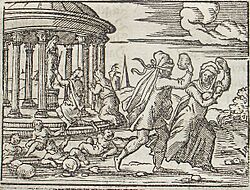Pyrrha facts for kids
Quick facts for kids Pyrrha |
|
|---|---|
| Queen of Thessaly | |
 |
|
| Abode | Phthia, Thessaly |
| Personal information | |
| Consort | (1) Deucalion (2) Zeus |
| Children | (1.i) Hellen, Pandora and Thyia (1.ii) Hellen, Protogeneia and Amphictyon (1.iii) Orestheus, Marathonius and Pronoos (1.iv) Melantho (1.v) Candybus (2) Hellen or Helmetheus |
| Parents | Epimetheus and Pandora |
In Greek mythology, Pyrrha (pronounced PIR-uh; from Greek: Πύῤῥα) was a very important figure. She was the daughter of Epimetheus and Pandora. Pyrrha was married to Deucalion, and together they had several children, including three sons: Hellen, Amphictyon, and Orestheus. They also had three daughters: Protogeneia, Pandora II, and Thyia. Some stories even say that Hellen was also a son of Pyrrha and Zeus, the king of the gods.
Contents
What Her Name Means
The name Pyrrha comes from the Greek word purrhos, which means "flame-colored" or "red." This name was often used for people with red hair. Both ancient writers like Horace and Ovid described Pyrrha as having red hair.
The Great Flood Story
Surviving the Flood
According to Greek myths, the god Zeus decided to end the Bronze Age by sending a huge flood to cover the Earth. This flood was meant to wipe out almost all of humanity. However, Pyrrha and her husband, Deucalion, were the only ones who survived.
Even though he was imprisoned, Prometheus, a wise Titan who could see the future, knew the flood was coming. He warned his son, Deucalion, and told him to build a large wooden ark (like a big boat). Because they listened to Prometheus, Pyrrha and Deucalion were able to survive the terrible flood.
Landing on Mount Parnassus
During the flood, their ark floated for many days. When the waters finally began to go down, they landed on Mount Parnassus. This mountain was the only place that was not covered by the floodwaters. They were the only two people left on Earth.
Repopulating the Earth
Once the flood was over and Pyrrha and Deucalion were safely on land, they wondered how to bring people back to the world. Deucalion went to the oracle of Themis, a goddess of divine law, to ask for guidance. The oracle told him to throw "the bones of his mother" behind his shoulder.
Pyrrha and Deucalion thought carefully about this message. They realized that "mother" probably meant Gaia, who was Mother Earth, the mother of all living things. And the "bones" were likely the rocks on the ground.
So, they started picking up rocks and throwing them over their shoulders. As the rocks landed, something amazing happened! The rocks began to change. They became softer and started to take on human shapes. The soft, wet parts of the rocks became skin, the veins in the rocks became human veins, and the hardest parts became bones. The stones that Pyrrha threw turned into women, and the stones that Deucalion threw turned into men. This is how the Earth was repopulated after the great flood.
Ovid's Version of the Story
The Roman poet Ovid also tells the story of Deucalion and Pyrrha in his famous collection of myths called Metamorphoses. In Ovid's version, Jove (who is the Roman name for Zeus) felt sorry for the couple. He saw that they were good and religious people. So, he stopped the rain and ended the flood just to save Deucalion and Pyrrha, who were floating on a small raft.
After the storm cleared and the water went down, Deucalion and Pyrrha saw how empty and destroyed the land was. They understood that it was up to them to bring life back to the world. They went to the goddess Themis for advice. Themis gave them the same instruction: to throw the bones of their mother behind them. Pyrrha was upset at first, thinking she had to dig up her own mother's bones. But Deucalion wisely figured out that Themis meant Mother Earth. So, they threw stones over their shoulders, and just like in the Greek version, Pyrrha's stones became women, and Deucalion's stones became men.
Ovid also explains that after humans returned, Mother Earth started to create all other forms of life. He wrote that heat and water are the sources of all life, saying that when they mix in the right way, they create everything.
Family Tree of the Hellenes
The "Hellenes" are what the ancient Greeks called themselves. The family tree below shows how Pyrrha and Deucalion are connected to many important figures in Greek mythology, especially through their son Hellen, who is considered the ancestor of all Greeks.
| Genealogy | |||||||||||||||||||||||||||||||||||||||||||||||||||||||||||||||||||||||||||||||||||||||||||||||||||||||||||||||||||||||||||||||||||||||||||||||||||||||||||||||||||||||||||||||||||||||||||||||||||||||||||||||||||||||||||||||||||||||||||||||||||||||||||||||||||||||||||||||||||||||||||||||||||||||||||||||||||||||||||||||||||||||||||||||||||||||||||||||||||||||||||||||||||||||||||||||||||||||||||||||||||||||||||||||||||||||||||||||||||||||||||||||||||||||||||||||||||||||||||||||||||||||||||||||||||||||||||||||||||||||||||||||||||||||||||||||||||||||||||||||||||||||||||||||||||||||||||||||||||||||||||||||||||||||||||||||||||||||||||||||||||||||||||||||||||||||||||||||||||||||||||||||||||||||||||||||||||||||||||||||||||||||||||||||||||||||||||||||||||||||||||||||||||||||||||||||||||||||||||||||||||||||||||||||||||||||||||||||||||||||||||||||||||||||||||||||||||||||||||||||
|---|---|---|---|---|---|---|---|---|---|---|---|---|---|---|---|---|---|---|---|---|---|---|---|---|---|---|---|---|---|---|---|---|---|---|---|---|---|---|---|---|---|---|---|---|---|---|---|---|---|---|---|---|---|---|---|---|---|---|---|---|---|---|---|---|---|---|---|---|---|---|---|---|---|---|---|---|---|---|---|---|---|---|---|---|---|---|---|---|---|---|---|---|---|---|---|---|---|---|---|---|---|---|---|---|---|---|---|---|---|---|---|---|---|---|---|---|---|---|---|---|---|---|---|---|---|---|---|---|---|---|---|---|---|---|---|---|---|---|---|---|---|---|---|---|---|---|---|---|---|---|---|---|---|---|---|---|---|---|---|---|---|---|---|---|---|---|---|---|---|---|---|---|---|---|---|---|---|---|---|---|---|---|---|---|---|---|---|---|---|---|---|---|---|---|---|---|---|---|---|---|---|---|---|---|---|---|---|---|---|---|---|---|---|---|---|---|---|---|---|---|---|---|---|---|---|---|---|---|---|---|---|---|---|---|---|---|---|---|---|---|---|---|---|---|---|---|---|---|---|---|---|---|---|---|---|---|---|---|---|---|---|---|---|---|---|---|---|---|---|---|---|---|---|---|---|---|---|---|---|---|---|---|---|---|---|---|---|---|---|---|---|---|---|---|---|---|---|---|---|---|---|---|---|---|---|---|---|---|---|---|---|---|---|---|---|---|---|---|---|---|---|---|---|---|---|---|---|---|---|---|---|---|---|---|---|---|---|---|---|---|---|---|---|---|---|---|---|---|---|---|---|---|---|---|---|---|---|---|---|---|---|---|---|---|---|---|---|---|---|---|---|---|---|---|---|---|---|---|---|---|---|---|---|---|---|---|---|---|---|---|---|---|---|---|---|---|---|---|---|---|---|---|---|---|---|---|---|---|---|---|---|---|---|---|---|---|---|---|---|---|---|---|---|---|---|---|---|---|---|---|---|---|---|---|---|---|---|---|---|---|---|---|---|---|---|---|---|---|---|---|---|---|---|---|---|---|---|---|---|---|---|---|---|---|---|---|---|---|---|---|---|---|---|---|---|---|---|---|---|---|---|---|---|---|---|---|---|---|---|---|---|---|---|---|---|---|---|---|---|---|---|---|---|---|---|---|---|---|---|---|---|---|---|---|---|---|---|---|---|---|---|---|---|---|---|---|---|---|---|---|---|---|---|---|---|---|---|---|---|---|---|---|---|---|---|---|---|---|---|---|---|---|---|---|---|---|---|---|---|---|---|---|---|---|---|---|---|---|---|---|---|---|---|---|---|---|---|---|---|---|---|---|---|---|---|---|---|---|---|---|---|---|---|---|---|---|---|---|---|---|---|---|---|---|---|---|---|---|---|---|---|---|---|---|---|---|---|---|---|---|---|---|---|---|---|---|---|---|---|---|---|---|---|---|---|---|---|---|---|---|---|---|---|---|---|---|---|---|---|---|---|---|---|---|---|---|---|---|---|---|---|---|---|---|---|---|---|---|---|---|---|---|---|---|---|---|---|---|---|---|---|---|---|---|---|---|---|---|---|---|---|---|---|---|---|---|---|---|---|---|---|---|---|---|---|---|---|---|---|---|---|---|---|---|---|---|---|---|---|---|---|---|---|---|---|---|---|---|---|---|---|---|---|---|---|---|---|---|---|---|---|---|---|---|---|---|---|---|---|---|---|---|---|---|---|---|---|---|---|---|---|---|---|---|---|---|---|---|---|---|---|---|---|---|---|---|---|---|---|---|---|---|---|---|---|---|---|---|---|---|---|---|---|---|---|---|---|---|---|---|---|---|---|---|---|---|---|---|---|---|---|---|---|---|---|---|---|---|---|---|---|---|---|---|---|---|---|---|---|---|---|---|---|---|---|---|---|---|---|---|---|---|---|---|---|---|---|---|---|---|---|---|---|---|---|---|---|---|---|---|---|---|---|---|---|---|---|---|---|---|---|---|---|---|---|---|---|---|---|
|
|||||||||||||||||||||||||||||||||||||||||||||||||||||||||||||||||||||||||||||||||||||||||||||||||||||||||||||||||||||||||||||||||||||||||||||||||||||||||||||||||||||||||||||||||||||||||||||||||||||||||||||||||||||||||||||||||||||||||||||||||||||||||||||||||||||||||||||||||||||||||||||||||||||||||||||||||||||||||||||||||||||||||||||||||||||||||||||||||||||||||||||||||||||||||||||||||||||||||||||||||||||||||||||||||||||||||||||||||||||||||||||||||||||||||||||||||||||||||||||||||||||||||||||||||||||||||||||||||||||||||||||||||||||||||||||||||||||||||||||||||||||||||||||||||||||||||||||||||||||||||||||||||||||||||||||||||||||||||||||||||||||||||||||||||||||||||||||||||||||||||||||||||||||||||||||||||||||||||||||||||||||||||||||||||||||||||||||||||||||||||||||||||||||||||||||||||||||||||||||||||||||||||||||||||||||||||||||||||||||||||||||||||||||||||||||||||||||||||||||||
See Also
- Noah's ark - Another famous story about a great flood.
 | Frances Mary Albrier |
 | Whitney Young |
 | Muhammad Ali |

